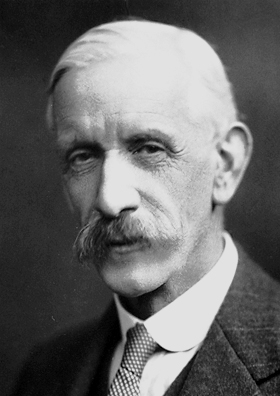Frederick Gowland Hopkins
British biochemist and Nobel laureate

Sir Frederick Gowland Hopkins (20 June 1861 – 16 May 1947) was a pioneering English biochemist who was awarded the Nobel Prize in Physiology or Medicine in 1929 for his discovery of vitamins. His work laid the foundation for the field of biochemistry and significantly advanced the understanding of nutrition and metabolism.
Early Life and Education[edit]
Frederick Gowland Hopkins was born in Eastbourne, Sussex, England. He was the eldest of eight children in a family with a strong interest in science and education. Hopkins attended the City of London School and later studied at University College London, where he developed an interest in chemistry. He completed his undergraduate studies in 1888 and went on to earn a doctorate in chemistry.
Career and Research[edit]
Hopkins began his career as a lecturer in physiology at Guy's Hospital in London. In 1898, he joined the University of Cambridge as a lecturer in chemical physiology. It was here that he conducted his groundbreaking research on the role of amino acids and enzymes in metabolism.
Discovery of Vitamins[edit]
Hopkins is best known for his discovery of vitamins, which he termed "accessory food factors." In 1912, he demonstrated that certain nutrients were essential for growth and health, leading to the identification of vitamins as crucial components of the diet. This discovery revolutionized the field of nutrition and led to the development of vitamin supplements.
Protein Metabolism[edit]
In addition to his work on vitamins, Hopkins made significant contributions to the understanding of protein metabolism. He discovered the amino acid tryptophan and elucidated its role in the body's metabolic processes. His research demonstrated that proteins are not only structural components of cells but also play a vital role in biochemical reactions.
Awards and Honors[edit]
In recognition of his contributions to science, Hopkins was awarded the Nobel Prize in Physiology or Medicine in 1929, which he shared with Christiaan Eijkman. He was also knighted in 1925 and received numerous other honors, including the Copley Medal from the Royal Society.
Legacy[edit]
Hopkins' work laid the groundwork for modern biochemistry and nutrition science. His discovery of vitamins has had a lasting impact on public health and has led to the prevention of numerous nutritional deficiencies. Today, he is remembered as one of the founding figures of biochemistry and a pioneer in the study of nutrition.
Related Pages[edit]
Ad. Transform your life with W8MD's Budget GLP-1 injections from $49.99


W8MD offers a medical weight loss program to lose weight in Philadelphia. Our physician-supervised medical weight loss provides:
- Weight loss injections in NYC (generic and brand names):
- Zepbound / Mounjaro, Wegovy / Ozempic, Saxenda
- Most insurances accepted or discounted self-pay rates. We will obtain insurance prior authorizations if needed.
- Generic GLP1 weight loss injections from $49.99 for the starting dose of Semaglutide and $65.00 for Tirzepatide.
- Also offer prescription weight loss medications including Phentermine, Qsymia, Diethylpropion, Contrave etc.
NYC weight loss doctor appointmentsNYC weight loss doctor appointments
Start your NYC weight loss journey today at our NYC medical weight loss and Philadelphia medical weight loss clinics.
- Call 718-946-5500 to lose weight in NYC or for medical weight loss in Philadelphia 215-676-2334.
- Tags:NYC medical weight loss, Philadelphia lose weight Zepbound NYC, Budget GLP1 weight loss injections, Wegovy Philadelphia, Wegovy NYC, Philadelphia medical weight loss, Brookly weight loss and Wegovy NYC
|
WikiMD's Wellness Encyclopedia |
| Let Food Be Thy Medicine Medicine Thy Food - Hippocrates |
Medical Disclaimer: WikiMD is not a substitute for professional medical advice. The information on WikiMD is provided as an information resource only, may be incorrect, outdated or misleading, and is not to be used or relied on for any diagnostic or treatment purposes. Please consult your health care provider before making any healthcare decisions or for guidance about a specific medical condition. WikiMD expressly disclaims responsibility, and shall have no liability, for any damages, loss, injury, or liability whatsoever suffered as a result of your reliance on the information contained in this site. By visiting this site you agree to the foregoing terms and conditions, which may from time to time be changed or supplemented by WikiMD. If you do not agree to the foregoing terms and conditions, you should not enter or use this site. See full disclaimer.
Credits:Most images are courtesy of Wikimedia commons, and templates, categories Wikipedia, licensed under CC BY SA or similar.
Translate this page: - East Asian
中文,
日本,
한국어,
South Asian
हिन्दी,
தமிழ்,
తెలుగు,
Urdu,
ಕನ್ನಡ,
Southeast Asian
Indonesian,
Vietnamese,
Thai,
မြန်မာဘာသာ,
বাংলা
European
español,
Deutsch,
français,
Greek,
português do Brasil,
polski,
română,
русский,
Nederlands,
norsk,
svenska,
suomi,
Italian
Middle Eastern & African
عربى,
Turkish,
Persian,
Hebrew,
Afrikaans,
isiZulu,
Kiswahili,
Other
Bulgarian,
Hungarian,
Czech,
Swedish,
മലയാളം,
मराठी,
ਪੰਜਾਬੀ,
ગુજરાતી,
Portuguese,
Ukrainian